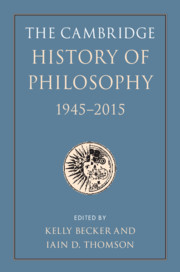Book contents
- The Cambridge History of Philosophy, 1945–2015
- The Cambridge History of Philosophy, 1945–2015
- Copyright page
- Contents
- Contributors
- Preface and Acknowledgments
- Introduction
- Part I Analytic Philosophy
- Part II Continental Philosophy
- Part III Bridge Builders, Border Crossers, Synthesizers, and Comparative Philosophy
- Section Eight Bridge Builders, Border Crossers, Synthesizers
- 42 Rethinking the Analytic/Continental Divide
- 43 Phenomenology and Ordinary Language Philosophy
- 44 Phenomenology Meets Philosophy of Mind and Language
- 45 The Impact of Pragmatism
- 46 Unruly Readers, Unruly Words
- 47 Anglo-American Existential Phenomenology
- 48 A Conceptual Genealogy of the Pittsburgh School
- Section Nine Comparative Philosophy
- Part IV Epilogue: On the Philosophy of the History of Philosophy
- References
- Index
48 - A Conceptual Genealogy of the Pittsburgh School
Between Kant and Hegel
from Section Eight - Bridge Builders, Border Crossers, Synthesizers
Published online by Cambridge University Press: 08 November 2019
- The Cambridge History of Philosophy, 1945–2015
- The Cambridge History of Philosophy, 1945–2015
- Copyright page
- Contents
- Contributors
- Preface and Acknowledgments
- Introduction
- Part I Analytic Philosophy
- Part II Continental Philosophy
- Part III Bridge Builders, Border Crossers, Synthesizers, and Comparative Philosophy
- Section Eight Bridge Builders, Border Crossers, Synthesizers
- 42 Rethinking the Analytic/Continental Divide
- 43 Phenomenology and Ordinary Language Philosophy
- 44 Phenomenology Meets Philosophy of Mind and Language
- 45 The Impact of Pragmatism
- 46 Unruly Readers, Unruly Words
- 47 Anglo-American Existential Phenomenology
- 48 A Conceptual Genealogy of the Pittsburgh School
- Section Nine Comparative Philosophy
- Part IV Epilogue: On the Philosophy of the History of Philosophy
- References
- Index
Summary
Unlike the Vienna Circle or the Frankfurt School, the Pittsburgh School was never self-consciously constituted as a coherent or even semi-coherent group by adopting this label. Rather, it seems to have been chosen as a retrospective name that functions to draw our attention to three prominent twentieth- and twenty-first-century philosophers whose work exhibits important commonalities and whose influence has been considerable: Wilfrid Sellars (1912–89), Robert Brandom (1950–), and John McDowell (1942–).
- Type
- Chapter
- Information
- The Cambridge History of Philosophy, 1945–2015 , pp. 664 - 676Publisher: Cambridge University PressPrint publication year: 2019
- 2
- Cited by

